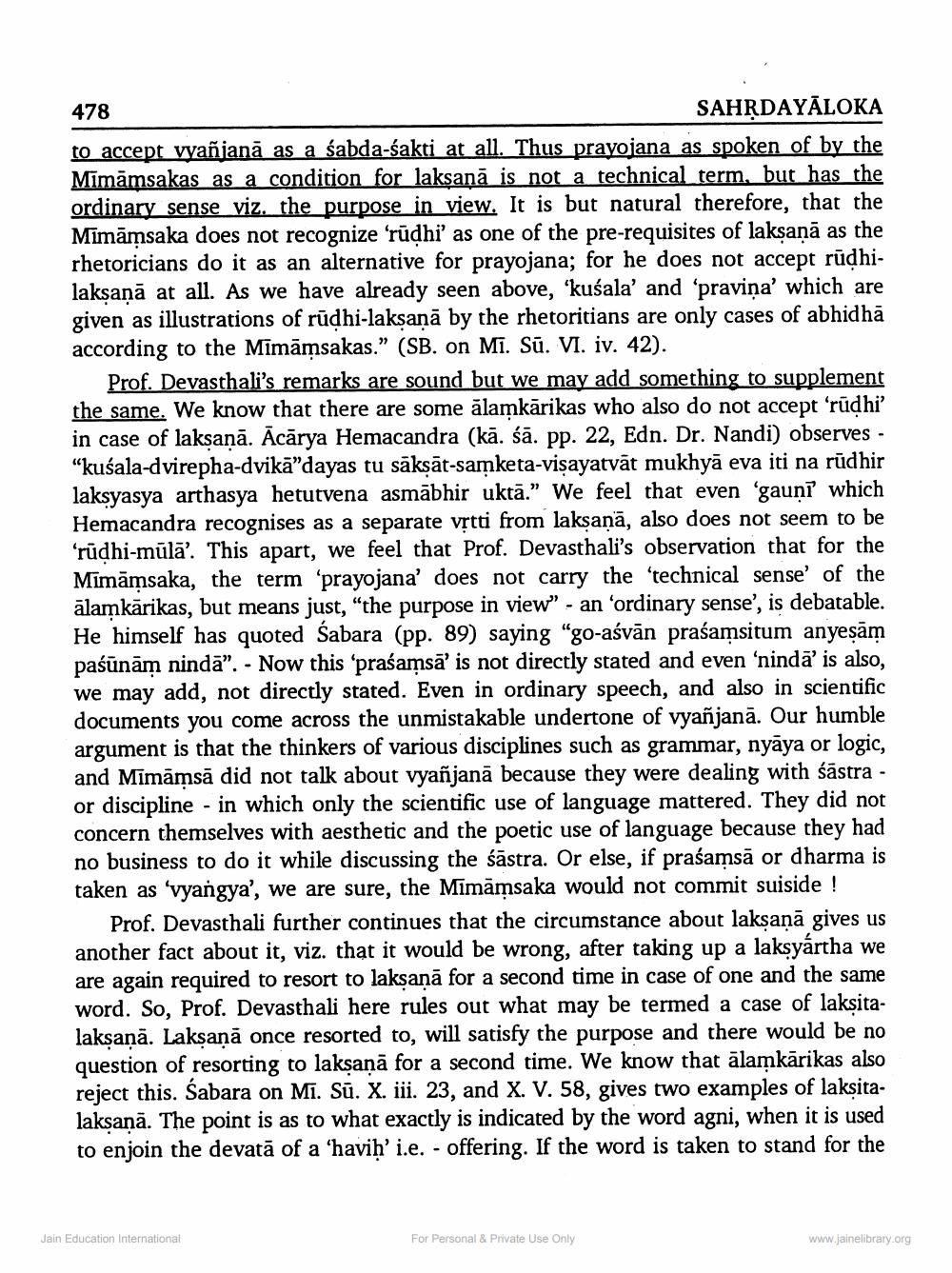________________
478
SAHṚDAYĀLOKA to accept vyañjanā as a śabda-śakti at all. Thus prayojana as spoken of by the Mimāmsakas as a condition for laksana is not a technical term, but has the ordinary sense viz. the purpose in view. It is but natural therefore, that the Mimāmsaka does not recognize 'rūḍhi' as one of the pre-requisites of lakṣaṇā as the rhetoricians do it as an alternative for prayojana; for he does not accept rūḍhilakṣaṇā at all. As we have already seen above, 'kuśala' and 'pravina' which are given as illustrations of rūḍhi-lakṣaṇā by the rhetoritians are only cases of abhidhā according to the Mīmāmsakas." (SB. on Mi. Sū. VI. iv. 42).
Prof. Devasthali's remarks are sound but we may add something to supplement the same. We know that there are some alamkarikas who also do not accept 'rūḍhi' in case of lakṣaṇā. Acārya Hemacandra (kā. śā. pp. 22, Edn. Dr. Nandi) observes - "kuśala-dvirepha-dvikā"dayas tu sākṣāt-samketa-viṣayatvāt mukhyā eva iti na rudhir laksyasya arthasya hetutvena asmābhir uktā." We feel that even 'gauni' which Hemacandra recognises as a separate vṛtti from lakṣaṇa, also does not seem to be 'rūḍhi-mūlā'. This apart, we feel that Prof. Devasthali's observation that for the Mīmāmsaka, the term 'prayojana' does not carry the 'technical sense' of the ālamkarikas, but means just, "the purpose in view" - an 'ordinary sense', is debatable. He himself has quoted Śabara (pp. 89) saying "go-aśvān praśamsitum anyeṣām paśūnām nindā". - Now this 'praśamsa' is not directly stated and even 'ninda' is also, we may add, not directly stated. Even in ordinary speech, and also in scientific documents you come across the unmistakable undertone of vyañjanā. Our humble argument is that the thinkers of various disciplines such as grammar, nyāya or logic, and Mīmāmsā did not talk about vyañjanā because they were dealing with śastra - or discipline in which only the scientific use of language mattered. They did not concern themselves with aesthetic and the poetic use of language because they had no business to do it while discussing the śastra. Or else, if praśamsā or dharma is taken as 'vyangya', we are sure, the Mimamsaka would not commit suiside !
Prof. Devasthali further continues that the circumstance about lakṣaṇā gives us another fact about it, viz. that it would be wrong, after taking up a lakṣyártha we are again required to resort to lakṣaṇā for a second time in case of one and the same word. So, Prof. Devasthali here rules out what may be termed a case of lakṣitalakṣaṇā. Lakṣaṇā once resorted to, will satisfy the purpose and there would be no question of resorting to lakṣaṇā for a second time. We know that alamkarikas also reject this. Śabara on Mi. Sū. X. iii. 23, and X. V. 58, gives two examples of lakṣitalakṣaṇā. The point is as to what exactly is indicated by the word agni, when it is used to enjoin the devata of a 'haviḥ' i.e. - offering. If the word is taken to stand for the
Jain Education International
For Personal & Private Use Only
www.jainelibrary.org




